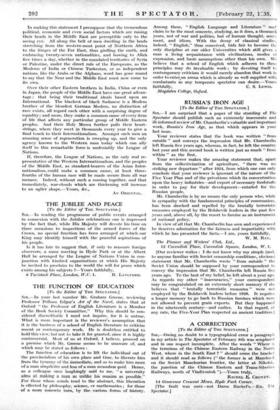RUSSIA'S IRON AGE
[To the Editor of THE SPECTATOR.] SIR,—I am surprised that a paper of the standing of The Spectator should publish such an extremely inaccurate and ill-informed review of Mr. Chamberlin's valuable and important work, Russia's Iron Age, as that which appears in your last issue.
Your reviewer states that the book was written "from outside" and conveys the impression that Mr. Chamberlin left Russia five years ago, whereas, in fact, he left the country last year and this second book is written just as much "from within" as the first.
Your reviewer makes the amazing statement that, apart from the collectivization of agriculture, "there was no striking new departure" after 1924, from which one can only conclude that your reviewer is ignorant of the nature of the Five Year Plan and of the privations which its concentration upon the heavy industries—and export of necessary foodstuffs in order to pay for their development—entailed for the Russian people.
Mr. Chamberlin is by no means the only person who, while in sympathy with the fundamental principles of communism, has been shocked and repelled by the brutally terroristic measures employed by the Bolshevik leaders in the past few years and, above all, by the resort to famine as an instrument of national policy.
In view of all that Mr. Chamberlin has seen and experienced he deserves admiration for the fairness and impartiality with which he has presented the facts.—I am, yours faithfully,
The Pioneer uR Writers' Club, Ltd., W. M. RAY.
12 Cavendish' -.31-ace-, Cavendish Square, London, W.1.
[Our reviewer writes : I do not know why my simple (and, to anyone familiar with Soviet censorship conditionF, obvious) statement that Mr. Chamberlin wrote "from outside" the Soviet Union should be supposed by your correspondent to convey the impression that Mr. Chamberlin left Russia five years ago. To the best of my belief, he left about a year ago. As regards my other "inaccuracies" your correspondent may be congratulated on an extremely short memory if she believes that "brutally terroristic measures" were not employed by the Bolshevik leaders before 1928. It requires a longer memory to go back to Russian famines which were not allowed to prevent grain exports. But they happened in the nineteenth century—and earlier. In that regard, at any rate, the Five-Year Plan respected an ancient tradition.]


















































 Previous page
Previous page